Training Summary
- Managers are required to possess effective supervising positions at the same time with providing training for their employees.
- A delivery plan for creating a two-day training workshop for a hundred of managers on how to use effective feedback skills when delivering one-on-one performance reviews to their employees is needed.
While managers need to be sure that they possess required competencies to occupy supervising positions they are also often asked to provide training to employees (Blanchard & Thacker, 2013, p. 3). The aim of the presentation is to offer a delivery plan for creating a two-day training workshop for a hundred of managers on how to use effective feedback skills when delivering one-on-one performance reviews to their employees.
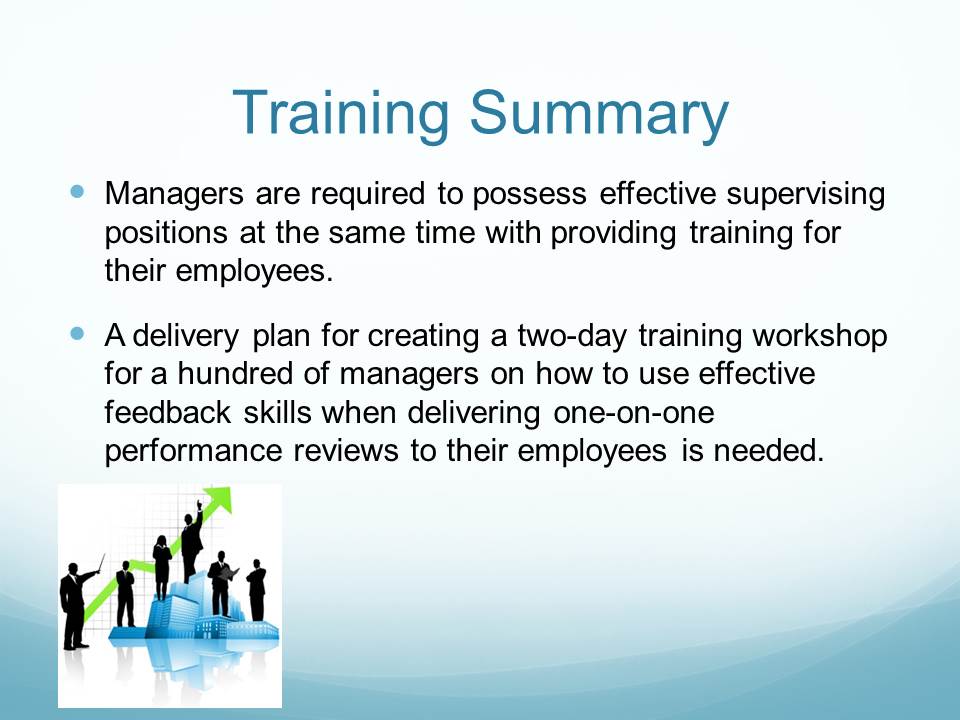
Training Objectives
- Developing feedback skills through coaching;
- Understanding performance reviews through lecturing;
- Developing an ability to motivate employees through role play.
When it comes to the performance of a particular organization, every employee and employer are affected by training. Every worker participates in training at some time in his or her career, usually a number of times.
Training will comprise three learning objectives: developing feedback skills through coaching; understanding performance reviews through lecturing; developing an ability to motivate employees through role play.
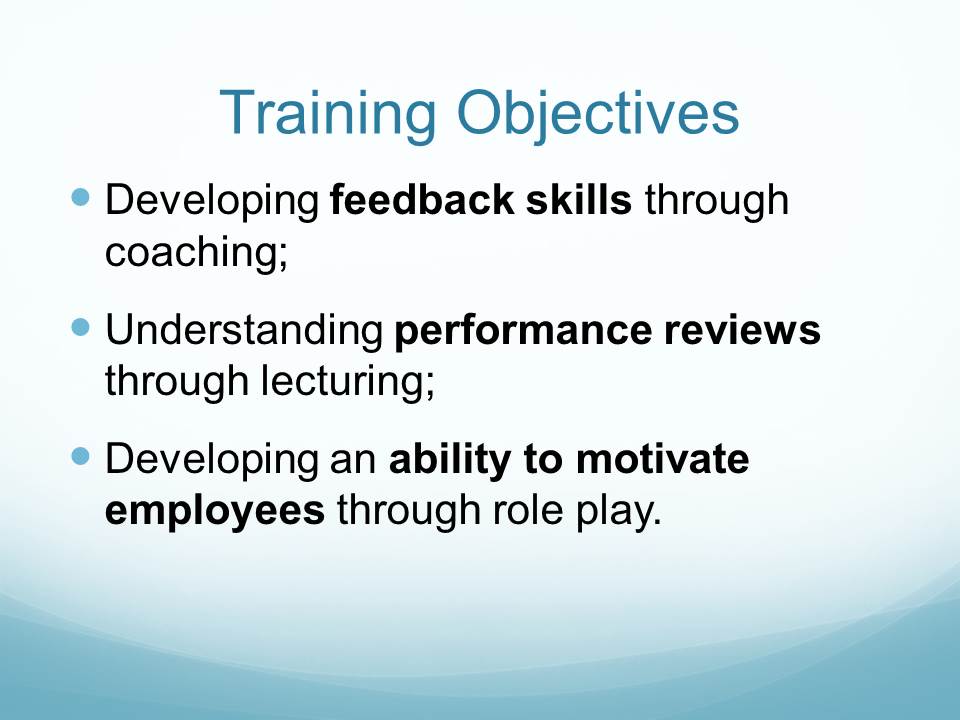
Day 1 – Developing Performance Feedback Skills
- Many supervisors avoid giving performance feedbacks since it is often uncomfortable and overwhelming (Peters, 2015, p. 1).
- The first learning objective for the training workshop is coaching managers to develop appropriate skills to ease the procedure of giving performance feedback to their employees.
The morning part of the first day of the training will be dedicated to developing performance feedback skills through coaching. Many supervisors avoid giving performance feedbacks since it is often uncomfortable and overwhelming (Peters, 2015, p. 1). Thus, the first learning objective for the training workshop is coaching managers to develop appropriate skills to ease the procedure of giving performance feedback to their employees.
- Coaching often implies the involvement of an outside consultant to assist managers in dealing with a particular type of issue (Blanchard & Thacker, 2013, p. 230).
- The room set up will involve a large auditorium with a large whiteboard where the consultant will write some points concerning the topic.
Coaching often implies the involvement of an outside consultant to assist managers in dealing with a particular type of issue (Blanchard & Thacker, 2013, p. 230). The room set up will involve a large auditorium with a large whiteboard where the consultant will write some points concerning the topic.
- 4 hours overall;
- Two 20-minute breaks;
- One hour for answering questions.
- Such a room set up will not allow for much discussions among participants; however, it is the most effective for the coach to provide a lesson to a hundred people audience.
The coaching will take four hours including two twenty-minute breaks and an hour for the coach to answer questions from trainees. Such a room set up will not allow for much discussions among participants; however, it is the most effective for the coach to provide a lesson to a hundred people audience.
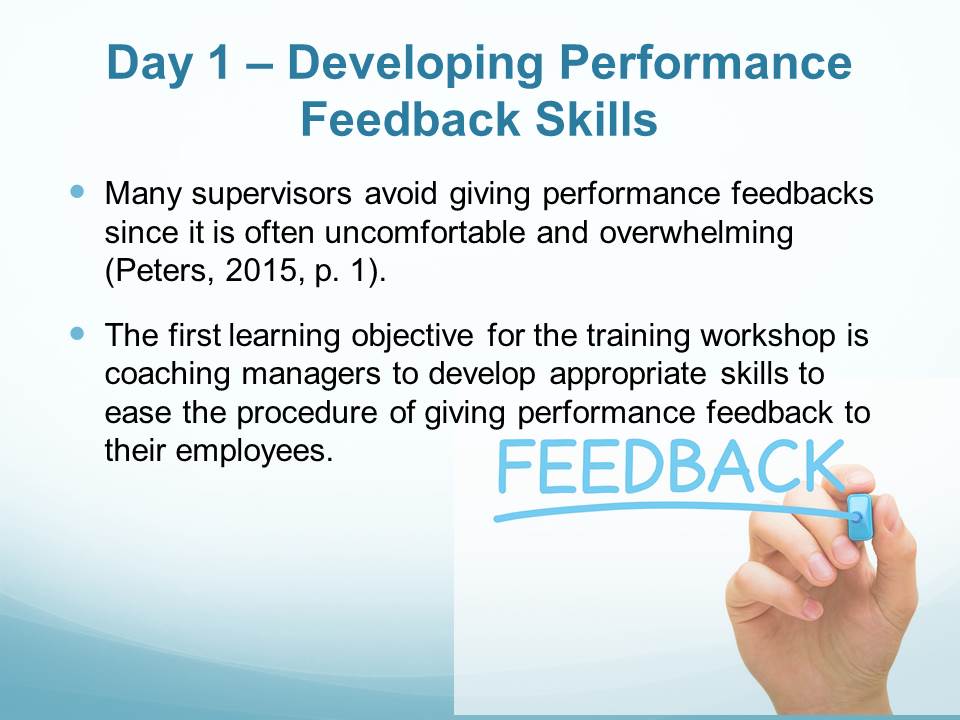
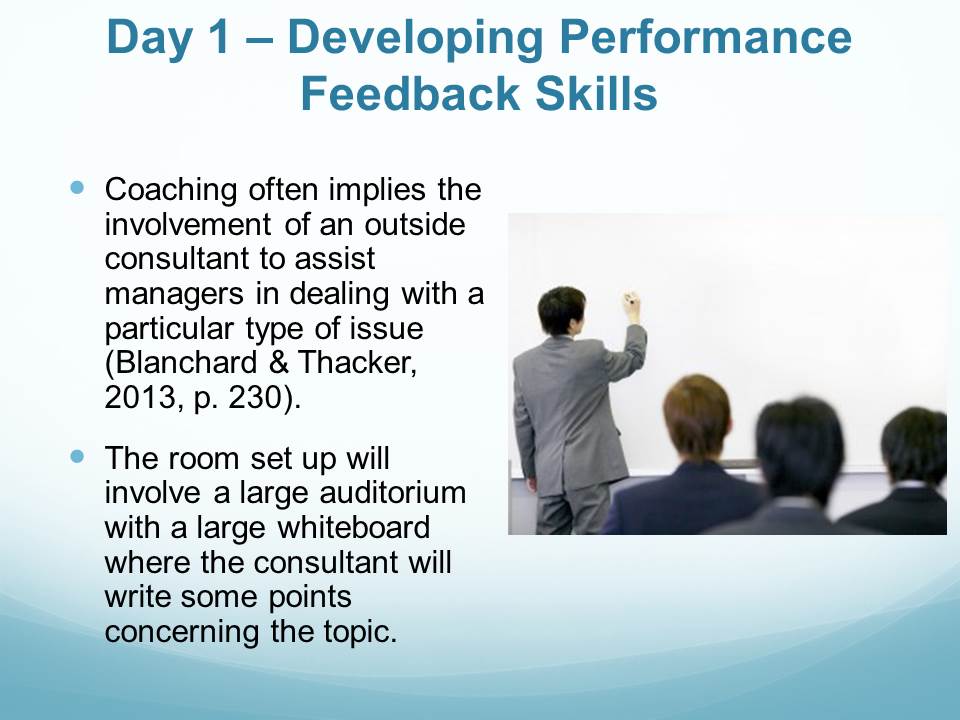
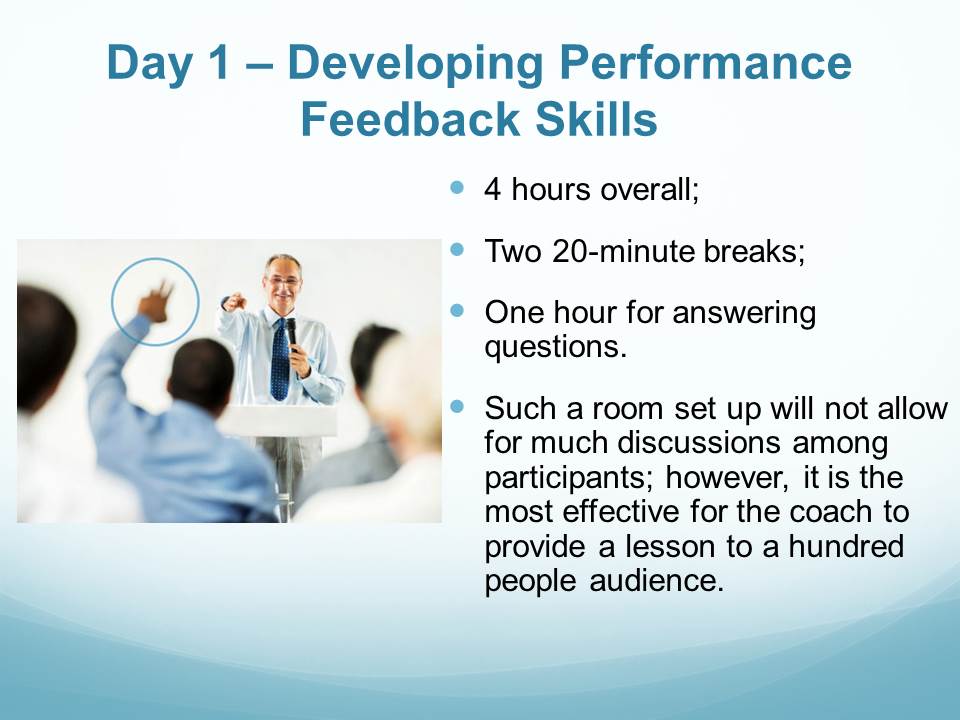
Day 2 – Understanding Performance Reviews
The benefits of a one-on-one performance review include company values reinforcement, strengthening culture in the workplace, and achieving the set strategic objectives (Busser, 2012, p. 32).
When discussing performance in a one-on-one discussion, company’s workers have an opportunity to reinforce the values a company holds, strengthen culture in the workplace, and achieve the strategic objectives set by the company (Busser, 2012, p. 32). Setting an objective of understanding performance reviews is important since such reviews offer a win-win experience for employers and their employees.
Lecture: principle of performance reviews and main components of performance reviews:
- how to share thoughtful information regularly;
- how to encourage employee-generated solutions;
- how to become an ally instead of a critic;
- and how to ask questions before giving out information.
The lecture that will take place on the second day of training will focus on the principle of performance reviews and its main components: how to share thoughtful information regularly; how to encourage employee-generated solutions; how to become an ally instead of a critic; and how to ask questions before giving out information.
The lecture will:
- Give managers a guideline for how to structure their work when it comes to one-on-one discussions with employees.
- Teach the importance of listening and understanding employees, as well as give their ideas a chance.
These components of a performance-based review will give managers a guideline for how to structure their work when it comes to one-on-one discussions with employees. In the course of the lecture, managers will learn the importance of listening and understanding employees, as well as give their ideas a chance.
Lecture:
- Large classroom;
- Trainees divided into groups;
- Encouraging discussions;
- One and a half-hour lecture;
- Half-an-hour break.
The lecture will take place in a large classroom or conference hall with tables as chairs so groups of managers will be distributed across the classroom in groups. Such sitting arrangement will encourage more informal conversations between a lecturer and the group. The lecturer will provide a one and a half-hour lecture with a half an hour break.
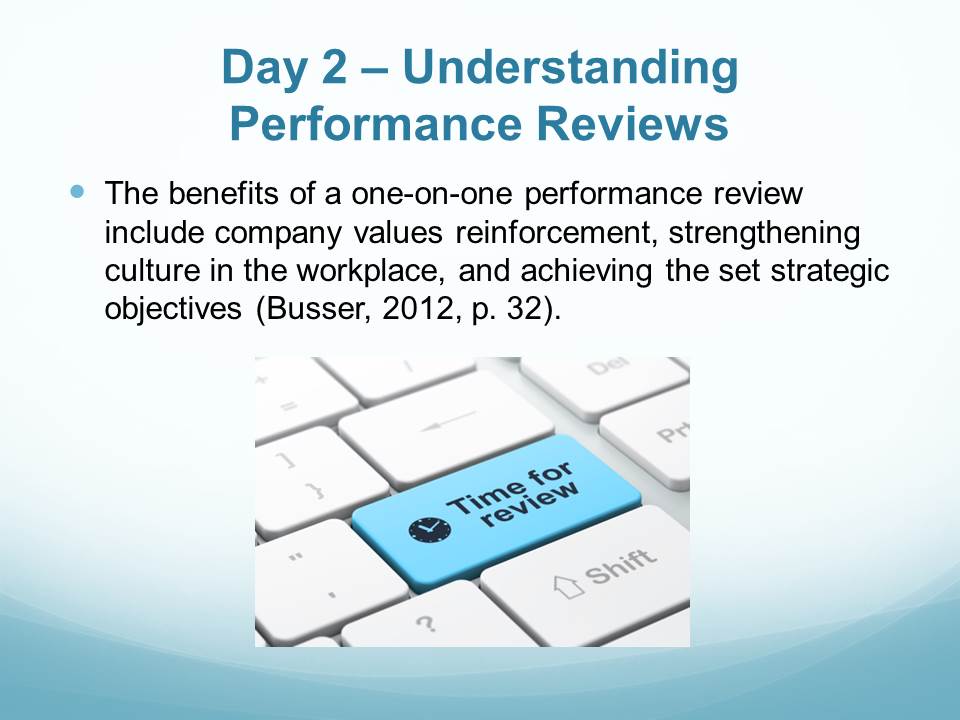
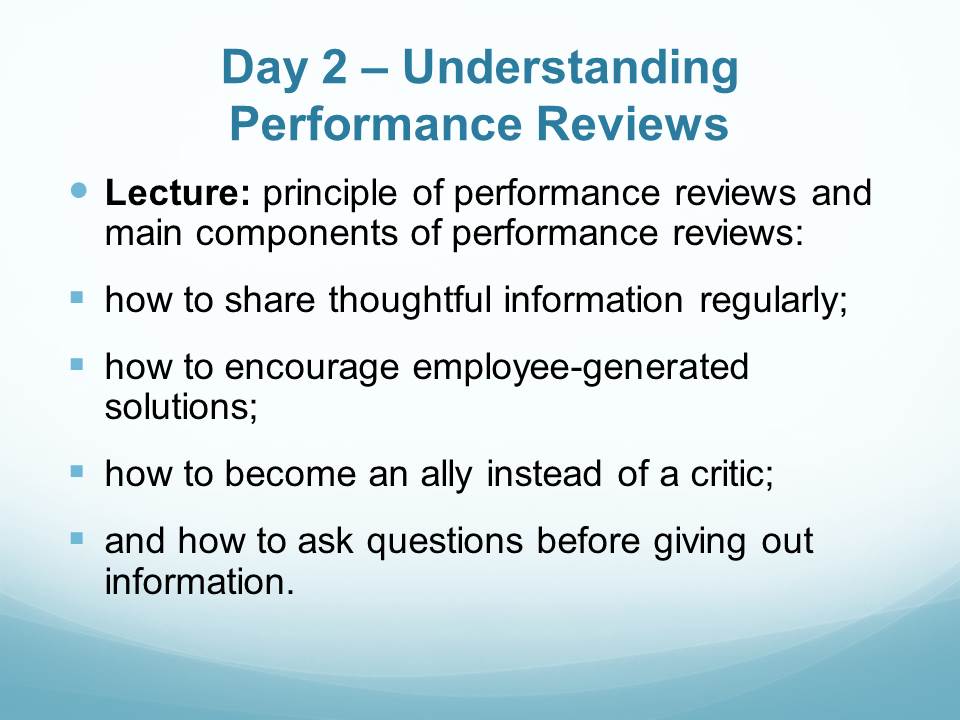
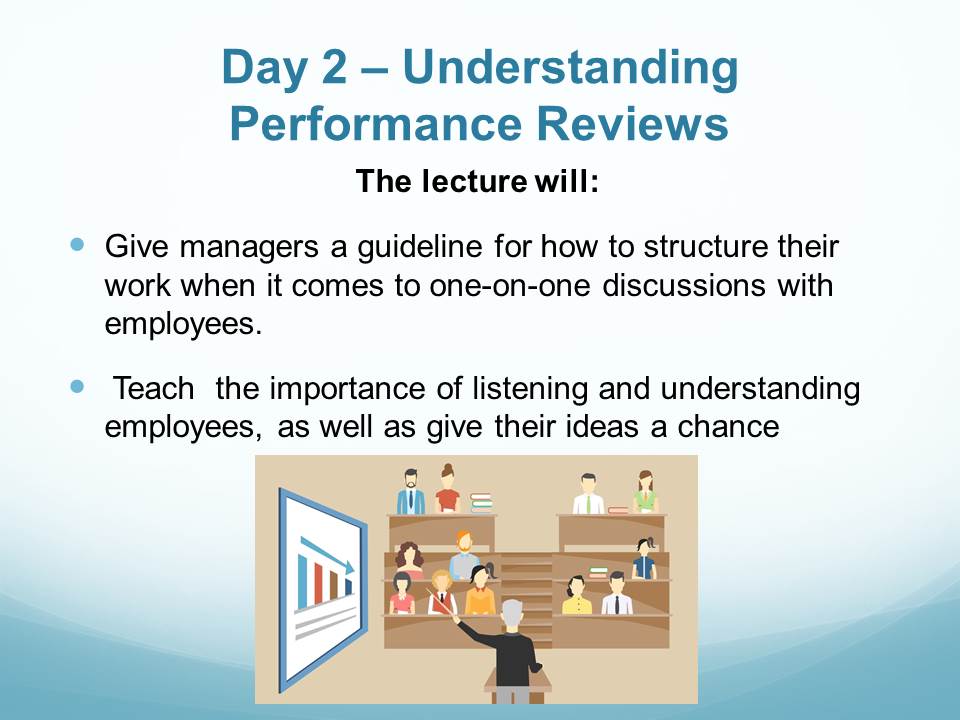
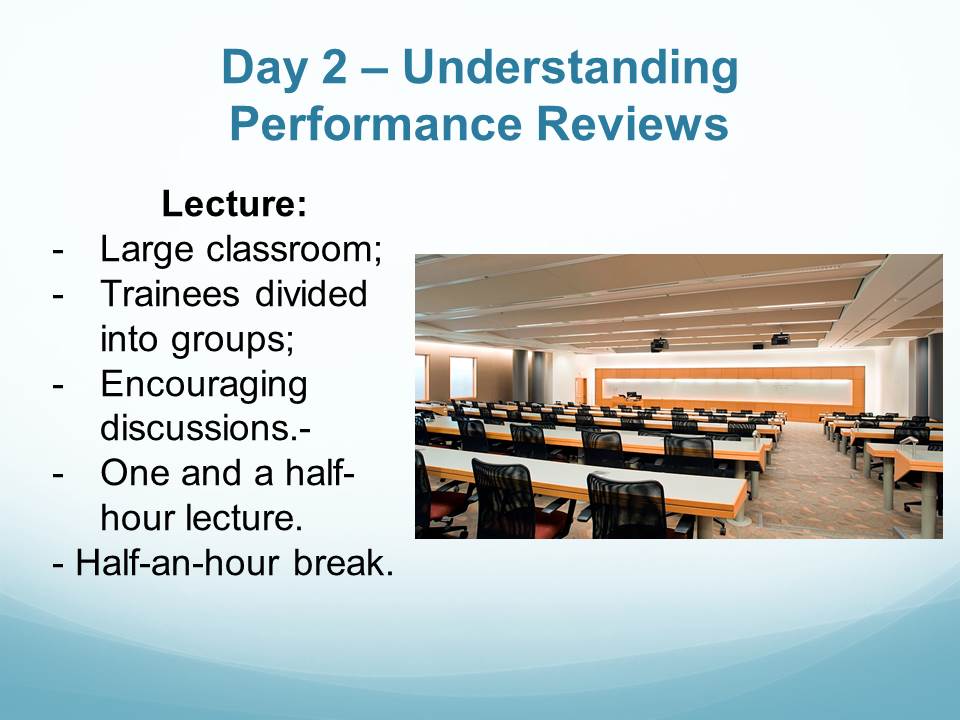
Day 2 – Developing an Ability to Motivate Employees
Performance management can:
- Motivate employees into reaching corporate goals;
- Give feedback on the performance of the employees while they are in the process of meeting the set expectations (Selden & Sowa, 2011, p. 253).
Performance management has been developed to motivate employees into reaching corporate goals. Performance management can motivate employees by setting goals and expectations as well as giving feedback on the performance of the employees while they are in the process of meeting the set expectations (Selden & Sowa, 2011, p. 253).
- Ability to motivate employees stems from practice.
⇓
- Role-playing game in which trainees will be divided into groups and given practical tasks.
- E.g.: one person will play a role of an employer, and other four are employees.
The last part of the two-day training will be a role-playing game in which trainees will be divided into groups and given practical tasks on the learned material. For example, in a group of five people, one person will play a role of an employer, and other four are employees with different goals and different performance indicators.
- Role-play in a training environment will facilitate discussions and active participation of managers.
The practical task:
- An employer should conduct a brief one-on-one performance feedback review with each employee and motivate them into doing their work effectively. Then roles change.
Role-play in a training environment will facilitate discussions and active participation of managers. The task of an employer will be to conduct a brief one-on-one performance feedback review with each employee and motivate them into doing their work effectively. Then roles change.
- Open-space environment, e.g., a park.
- Each group of trainees will find a suitable for them spot to complete their role-play task.
- Trainees will be monitored by five supervisors who will answer questions on the practical side of performance management as well as give managers advice on how to better structure their motivational discussions with their employees.
This activity will be better organized in an open space, for example, in a park, where each group of trainees will find a suitable for them spot to complete their role-play task. The trainees will be monitored by five supervisors who will answer questions on the practical side of performance management as well as give managers advice on how to better structure their motivational discussions with their employees.
- Completing a two-day training course for employees on a practical task will motivate managers themselves, giving them an inspiration to better communicate with their workers, set attainable goals, and motivate.
Completing a two-day training course for employees on a practical task will motivate managers themselves, giving them an inspiration to better communicate with their workers, set attainable goals, and motivate.
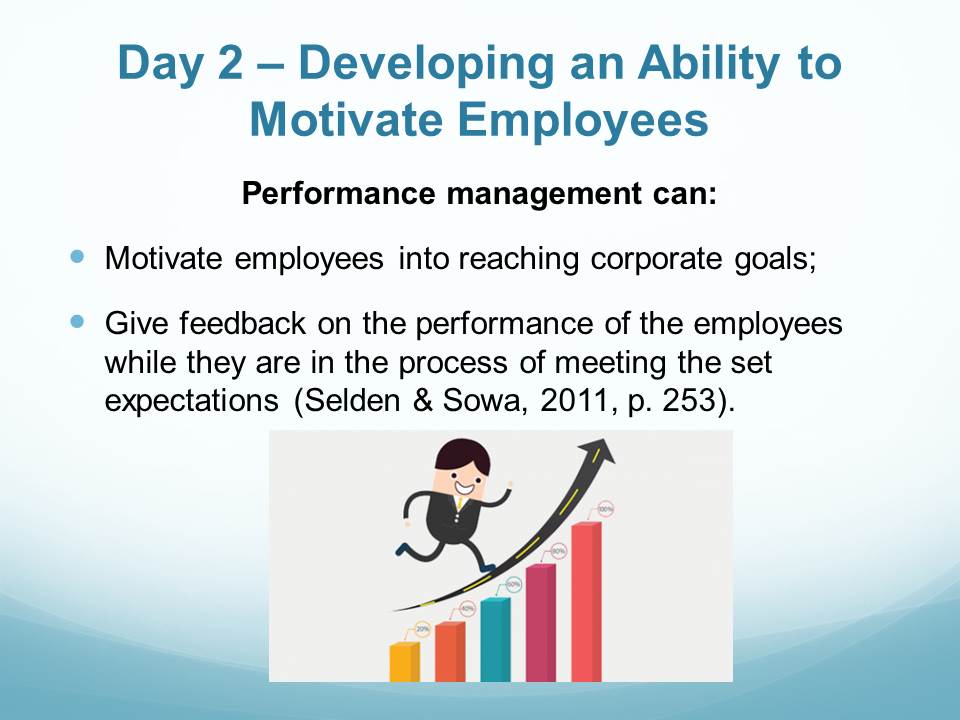
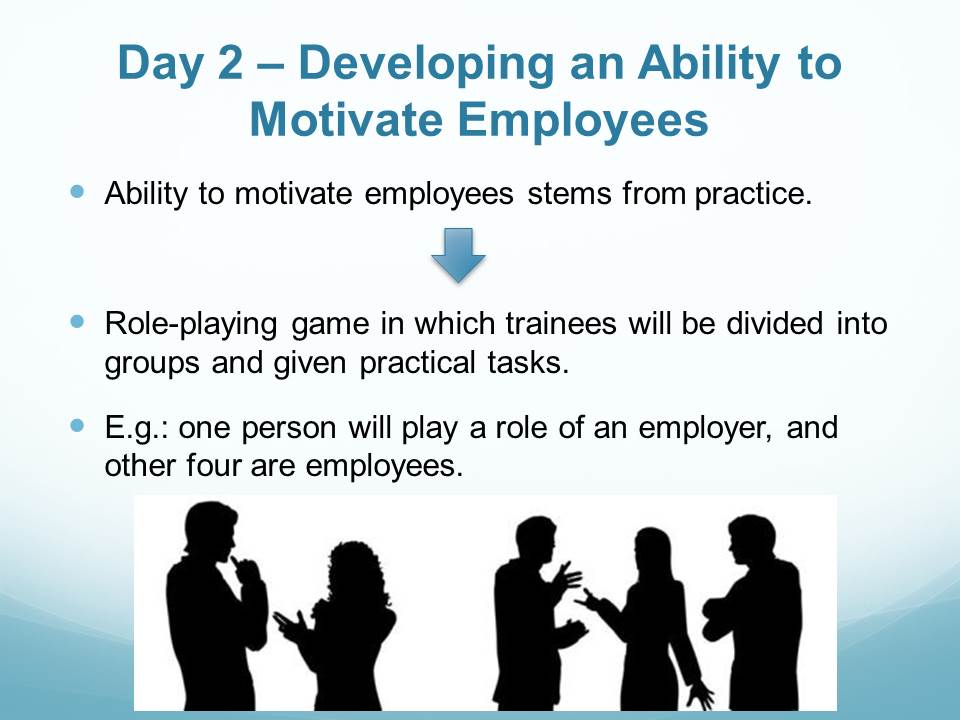
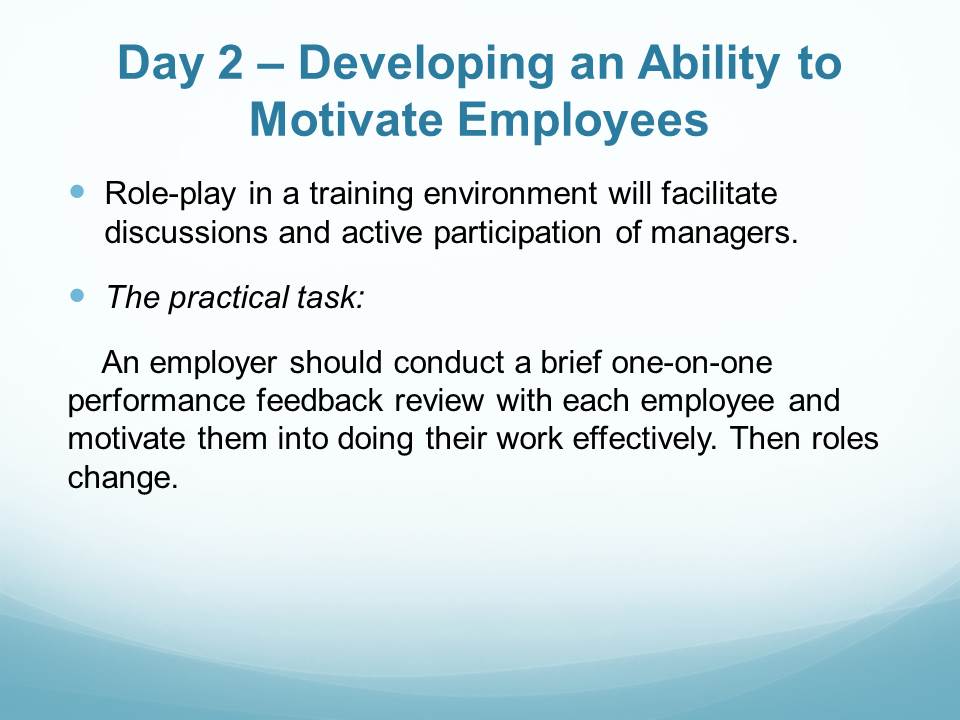
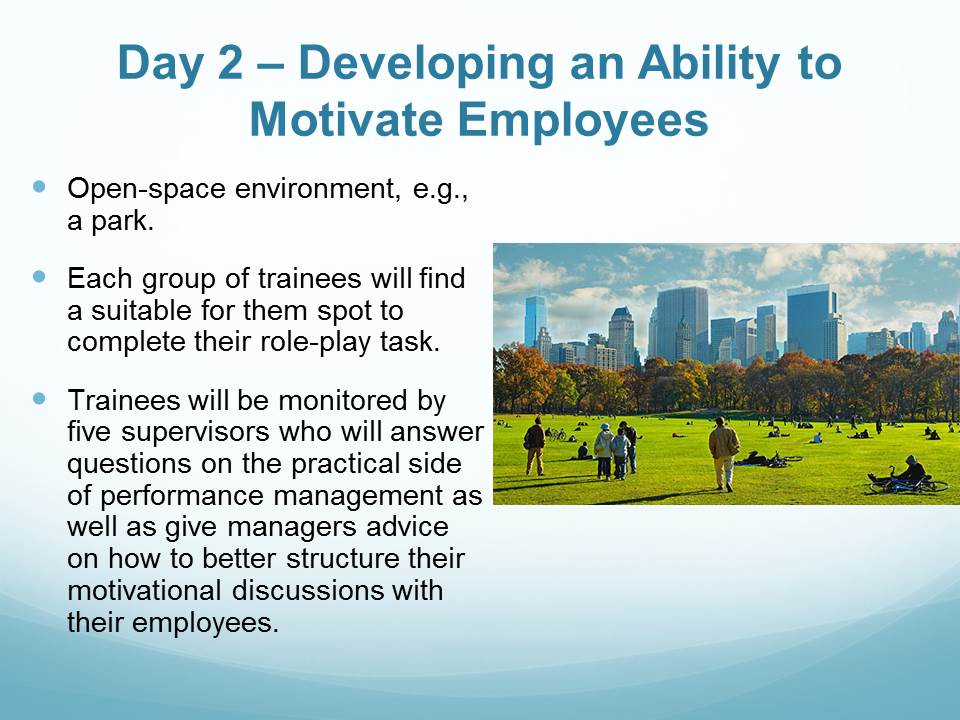
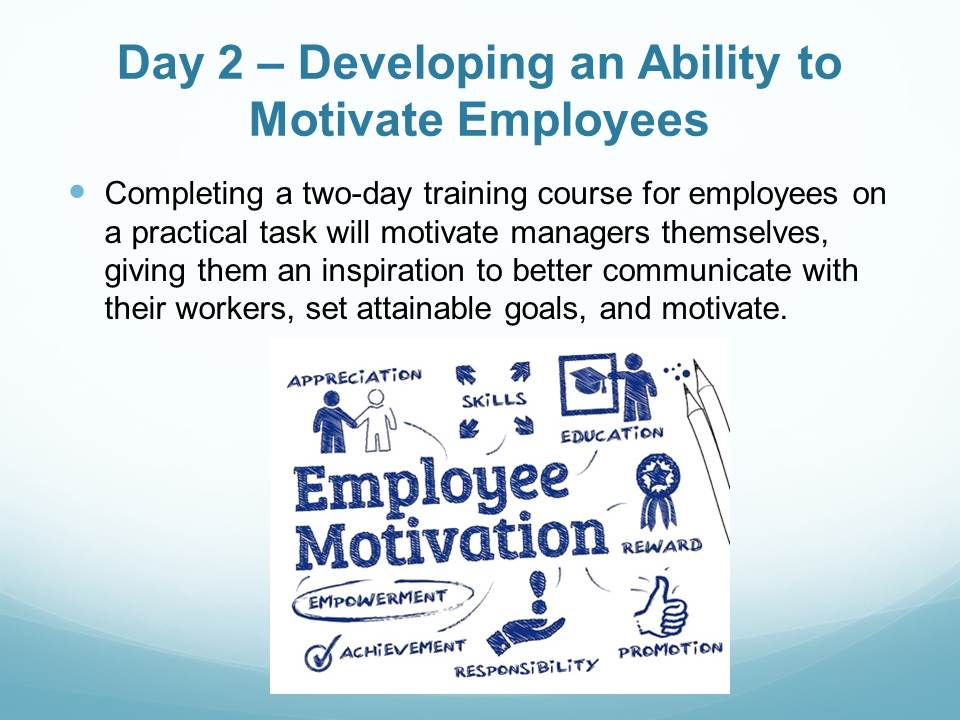
Concluding Remarks
- The two-day training will be effective for completing the established objectives.
- The manner in which every topic will be presented has been chosen in accordance with the basic principles of training.
- The last practical task will be a conclusion to the information presented through coaching and lecturing.
The two-day training will be effective for completing the established objectives: developing feedback skills through coaching; understanding performance reviews through lecturing; developing an ability to motivate employees through role play. The manner in which every topic will be presented has been chosen in accordance with the basic principles of training. The last practical task will be a conclusion to the information presented through coaching and lecturing.
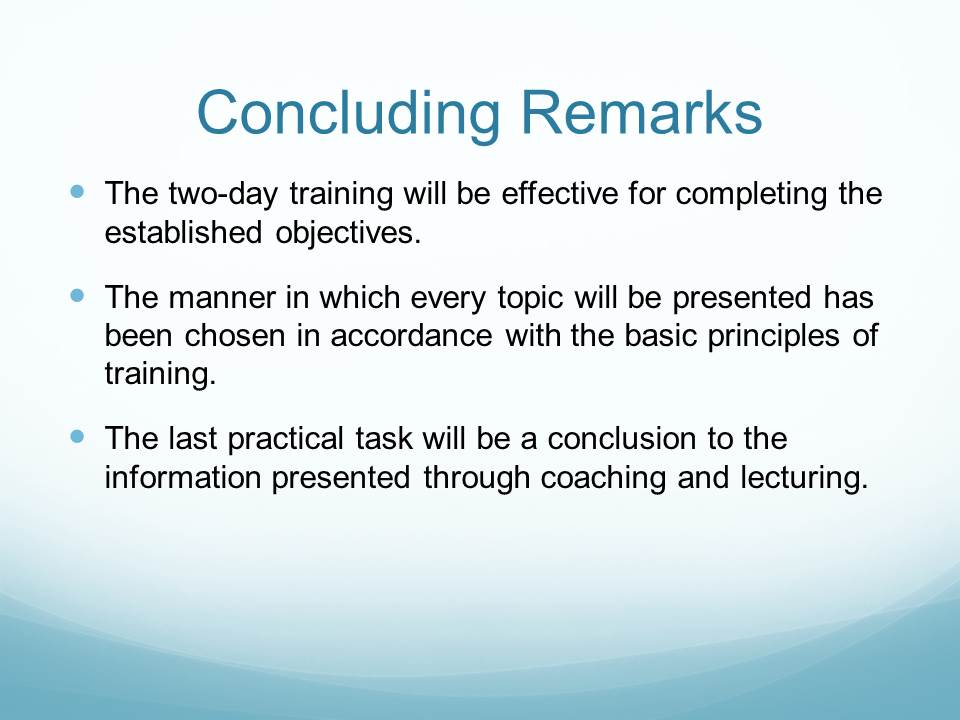
References
Blanchard, N., & Thacker, J. (2013). Effective training: Systems, strategies, and practices (5th ed.). Upper Saddle River, NJ: Pearson Education.
Busser, D. (2012). Delivering effective performance feedback. T+D, 66(4), 32-35.
Peters, P. (2015). 7 Tips for delivering performance feedback. Supervision, 76(2), 13-15.
Selden, S., & Sowa, J. (2011). Performance management and appraisal in human service organizations: Management and staff perspectives. Public Personnel Management, 40(3), 251-264.